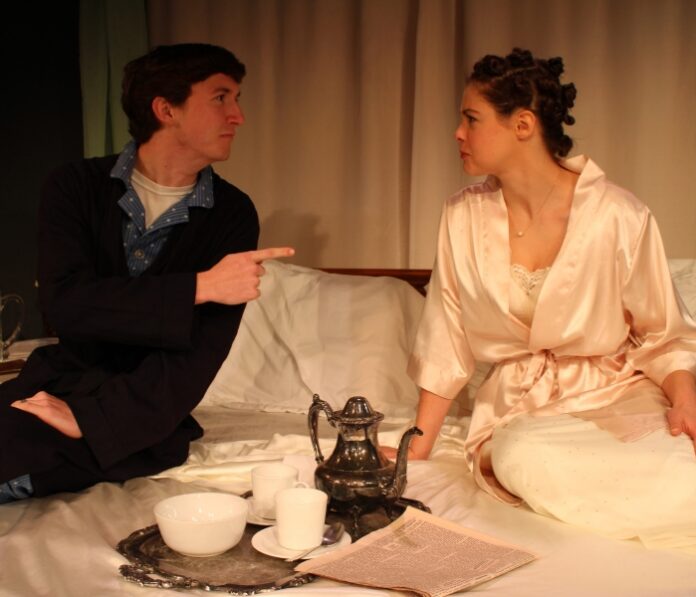Comedy and Culture
Last week UD’s drama department had two senior studios: “Ways and Means” and “The Flattering Word.”
While these two productions were chosen and directed independently by different drama majors, they also paired well with each other in back-to-back performances as a comparison of British and American humor.
“Ways and Means,” directed by Braden Barber, is the story of a married couple who have fallen into tremendous debt and are willing to find any way or means to escape it.
If you are a fan of British comedy, cutting remarks, or personal drama with the flair of British accents, then this is exactly your cup of tea!
Brennan Schmiedicke, who plays Toby Cartwright, does an excellent performance as an exasperated British husband in a financial crisis. His delivery of the British accent, sharp wit, and perfectly timed humor comes across very believably.
His performance is reminiscent of Bertie from P.G. Wodehouse’s Jeeves and Wooster. His character leaves you are simultaneously impressed by his wit, while also wanting to strangle the nefarious British weasel.
Amanda Wolfe plays Stella Cartwright, Toby Cartwright’s wife. Wolfe does an excellent job of portraying a shifty woman who is ready to scheme her way out of debt through her facial expressions and the way she carries herself on stage.
You will find yourself sympathizing with her for having such a prosperous husband, and then the next moment you realize she’ll match him blow for blow in their schemes to get out of debt and avoid embarrassment.
The second studio, “The Flattering Word”, directed by Sienna Castaneda Abbott, is the story of an actor visiting an old friend and using the flattery of theater to charm friends and family.
Visiting actor Eugene Tesh, played by JD Self, visits his old friend Mary, played by Elinor True, who has married a minister. The minister and the community that Mary finds herself surrounded by are religiously against the theater.
In a turn of events reminiscent of “Footloose,” Mr. Tesh convinces the household that theater is not evil by means of flattery and even invites them to his show that same night.
The supporting cast of Mrs. Zooker (Alice Forget) and her daughter Lena (Maggie Sonne) are fantastic in their roles as nosey neighbors and are quite susceptible to Mr. Tesh’s flattery and encouragement of Lena to one day join the theater.
Seamus Malloy, who plays Mary’s husband, the Reverend Loring Rigley, does an excellent job of portraying the character arc from reserved minister to enthusiastic thespian. It’s one of the few times the UD community can see Malloy on stage without hearing a Trump impression.
While the plays differ in time period, location, and theme, there are many parallels. Both make excellent use of the stage in their one act production without the aid of any scene changes.
The costumes were excellent, most notable was the late 1800’s style dress Elinor True wore playing Mary. Coincidentally, both plays show a wife who’s willing to team up with an old acquaintance from her past in order to trick the people around her and accomplish her goal.
These two plays are delightful to watch and also allow for a cultural reflection on humor in the English and American performances. British humor is sharp, dry, and witty. “Ways and Means” shows this in the Cartwright couple’s cutting remarks to each other.
American humor is loud, blunt, and visual. “The Flattering Word” shows this in Lena’s recitation of poetry, where she gives a wildly enthusiastic performance to impress the other characters, and adding his two cents, the Reverend continues the dramatic poem when Lena forgets the ending.
Both of these studios were delightful to watch, and you can see the effort put in by directors, actors, crew, costume team, and the many others who helped make these performances happen.
Seeing the show was a wonderful experience before heading into the chaos of finals week. It was an excellent way to both relax and enjoy time with friends, and also to think philosophically about the role of theater and cultural differences in comedy.
